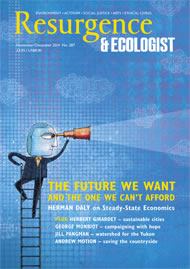In our modern world the idea of having a calling may seem somewhat old-fashioned, as in some kind of evangelical higher calling; or at least there is an assumption that a true calling is reserved for those with some kind of higher purpose or special talent. The implicit message we receive through our increasingly market-economy-driven educational institutions and commercially controlled media is one of prioritising career opportunities and earning potential over personal development and creative expression. This is variously represented in terms of being productive and useful within society, but all too often leads to a sense of unfulfilled potential and personal dissatisfaction, ultimately manifesting as destructive behaviours on a personal, social and ecological level.
In Hearing Our Calling, Gill Coombs challenges this assumption and argues that we all have a unique calling, which is often buried under layers of social norms and expectations. She approaches the topic of humans at work from a holistic perspective, not only drawing on her own work as a management coach and facilitator, but also finding insight from diverse fields such as ecology, biology, history, economics, psychology, physics, sociology and holistic science. She leads us through a review of the history of human work and the workplace that includes a critical appraisal of the commercially driven social engineering that has led to so many of us unwittingly carrying out work that is ultimately harmful to people, place and planet.
But it is in her presentation of the deeper processes underlying the current disconnect that her multidisciplinary, holistic approach really comes to the fore. While we might expect a book about work and the workplace to include a fair quotient of sociological and psychological analysis, Coombs surprises (and rewards) by broadening her palette and delving into the human experience in the wider context of our place within the whole of life. From this perspective she skilfully weaves a variety of case studies, both human and other than human, into the dialogue and takes us on a journey of exploration into the meaning of vocation.
She reminds us that finding our true purpose is fundamental to our journey, while our destination is an emergent property that is entirely dependent on the quality of our engagement with the journey. In this context the destination, or goal, is not measured in material success – prestige, position and money – but rather lies in our sense of connection, achievement and satisfaction with the work we are doing.
For Coombs this is the difference between hearing our calling (and acting on it) and not hearing it. In the two chapters devoted to this she highlights the contrasting processes involved and the vastly different outcomes. But for me the real strength of this book is in the way she deftly invites us to realise our personal calling as a pathway towards changing the destructive nature of our current paradigm and regaining our place in the broader community of life. She is optimistic about our chances of achieving this and underlines that optimism with her professional and personal vision of the society we can create.
Hearing Our Calling is a valuable contribution to the work of revisioning how we want to experience our Western societies.
"What do I want to do with the rest of my life?" Explore this question in a small group with Gill Coombs, author of Hearing Our Calling, at a beautiful, inspiring retreat in the French Alps. 4th-7th June 2015. For more information: www.maisonlacerisaie.com/retreats








